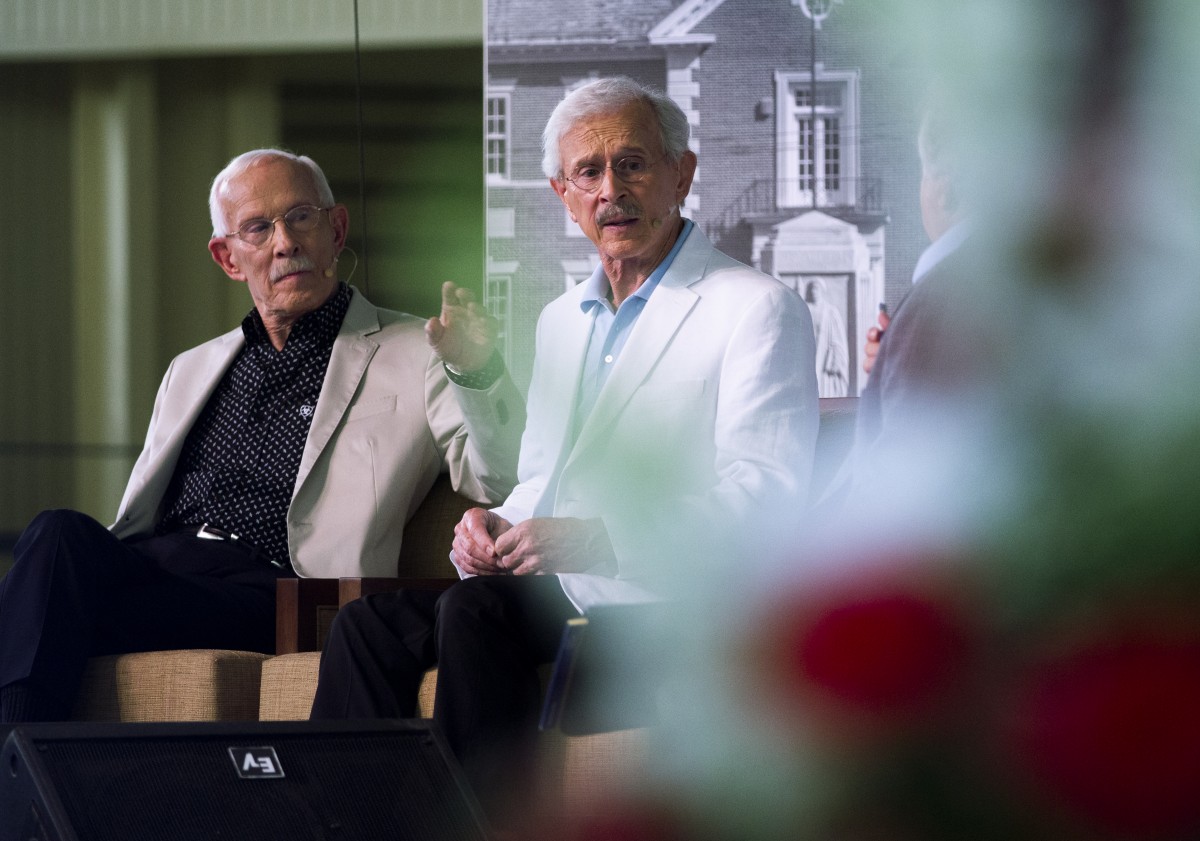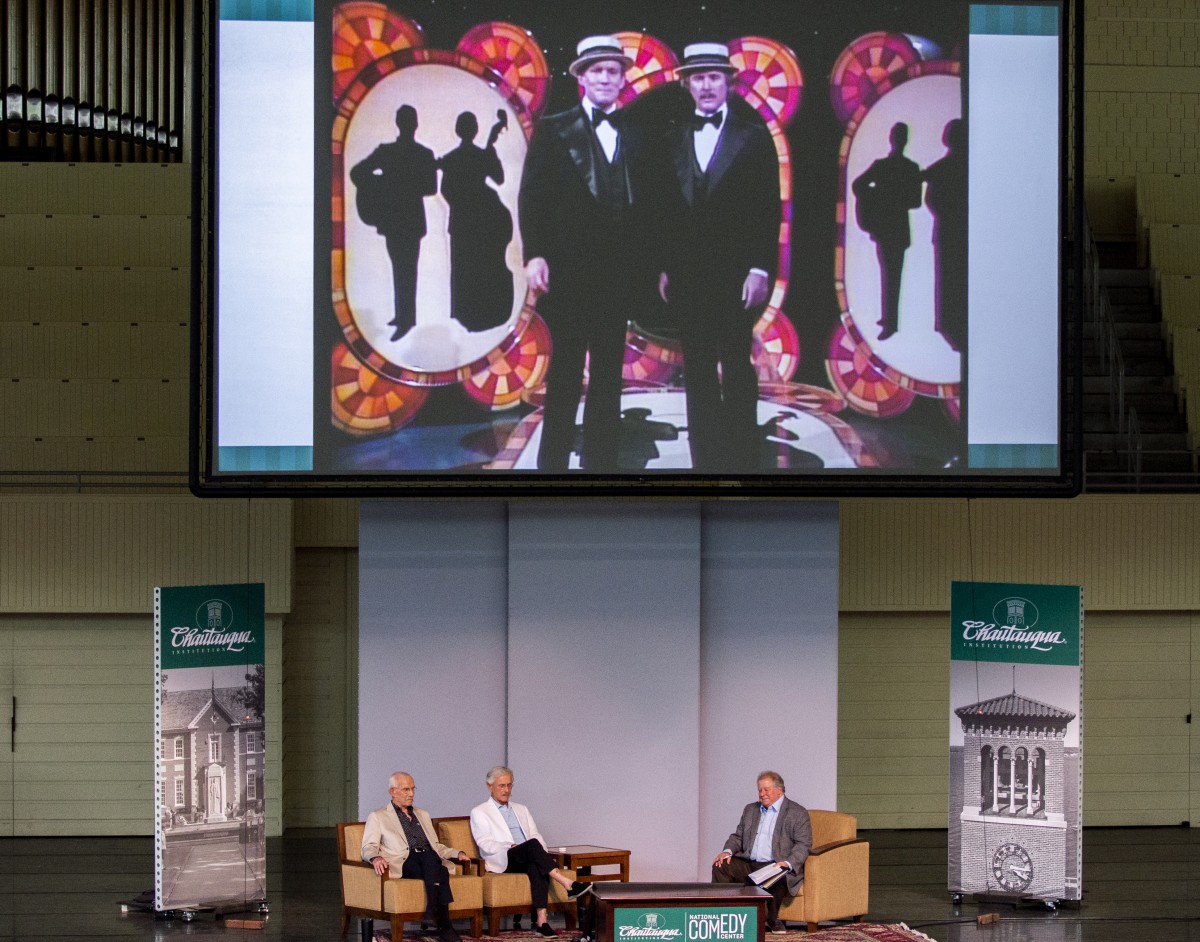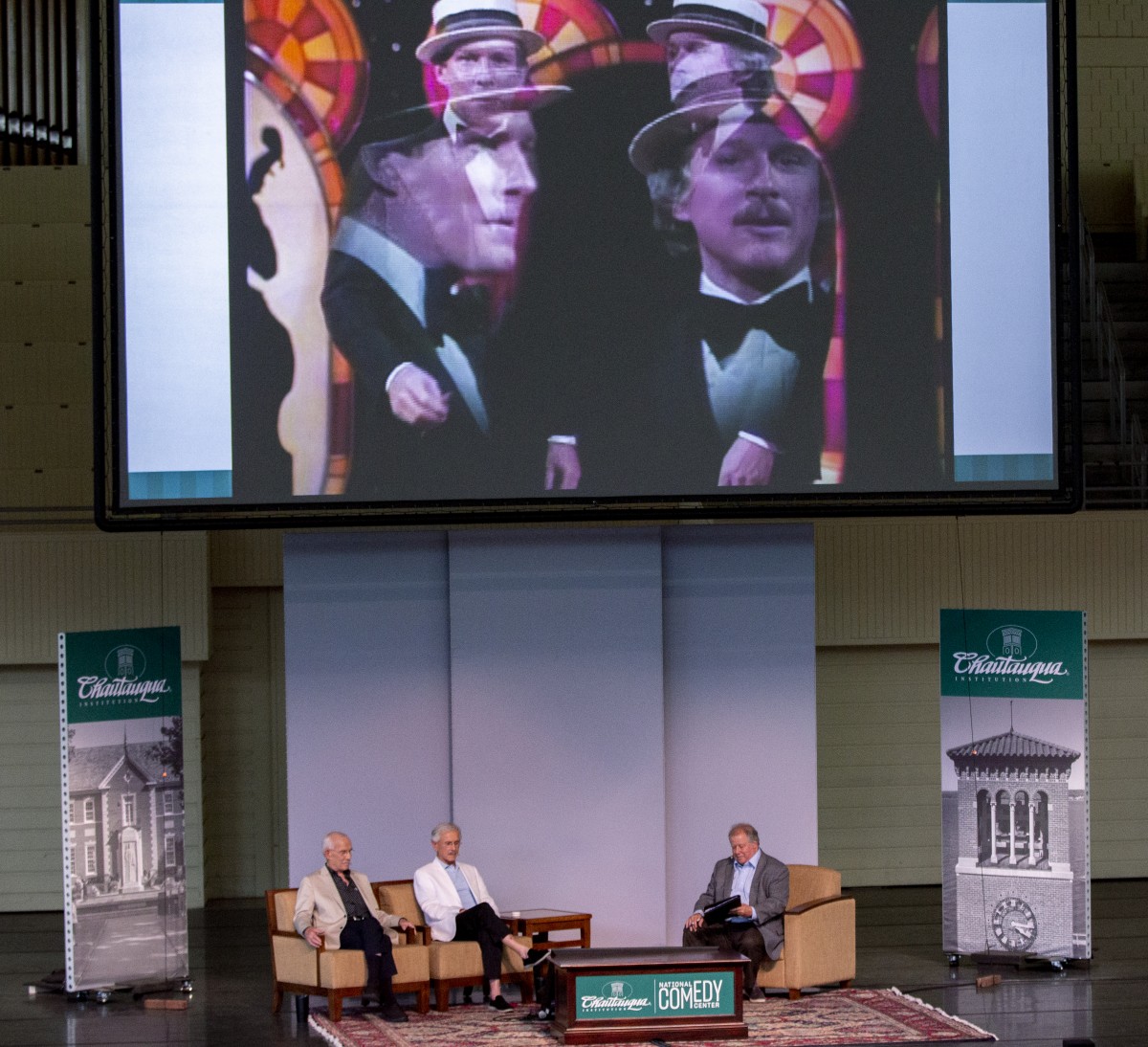Make no mistake, it was not the original Smothers Brothers who appeared at Chautauqua Institution Monday — that Dick and Tom died in 1969, along with their beloved show, “The Smothers Brothers Comedy Hour.”
Now, 50 years later, there seem to be no hard feelings.
“I’m still pissed off,” Tom Smothers said.
Opening Week Six, “What’s Funny? In Partnership with the National Comedy Center,” Tom and Dick Smothers were joined by David Bianculli, television critic for NPR’s “Fresh Air” and author of Dangerously Funny: The Uncensored Story of “The Smothers Brothers Comedy Hour,” at 10:45 a.m. Monday in the Amphitheater, for “The Smothers Brothers Reunited: Comedy and Censorship on the 50th Anniversary of their Network TV Firing.” Journey Gunderson, executive director of the National Comedy Center in Jamestown, announced at the beginning of the lecture that the Smothers Brothers will be donating their career archives to the National Comedy Center.
Banter ensued between the brothers without any help from Bianculli’s questions. As Tom Smothers explained that he met his brother in Buffalo so the two could arrive in Chautauqua together, he claimed he flew the plane from Wisconsin himself. Apparently, Tom Smothers has been a “pilot for 35 years.”
“That’s not true, you don’t fly planes” Dick Smothers said. “You’re not a pilot, so what are you talking about? We are going to keep this very brief; you fly as a passenger, a frequent flyer, and guess what? No matter how many miles you accumulate, they never upgrade you to pilot. Why make it up?”
“It didn’t take any effort,” Tom Smothers said.
“What possessed you to come out here and say you’re a pilot?” Dick Smothers said.
“I just didn’t recall that I’m not a pilot,” Tom said.
“That doesn’t make any sense,” Dick said. “You forgot you’re not a pilot? Why did you come out here and lie about it?”
“National policy,” Tom said.
“These guys were so important to television, and CBS realized it after they left,” says Bianculli.
— The Chautauquan Daily (@chqdaily) July 29, 2019
Bianculli watched as the audience erupted in laughter and realized, maybe too late, that he had no idea what he got himself into when he agreed to moderate the discussion.
“I have no idea if this is going to be the easiest or hardest interview I have ever done,” Bianculli said.
To open the discussion, Bianculli said despite the controversial history, “The Smothers Brothers Show” originally tried to “please everyone” when it aired in 1965.
“We wanted a universal show,” Tom Smothers said. “We’re entertainers, we’re here to entertain.”
Slowly but surely, CBS’ leadership became more “oppressive” with the show’s content. According to Dick Smothers, saying anything with “substance,” such as tackling sex education or the fact that “Ronald Reagan is a known heterosexual,” became a constant battle for the brothers.
“The ’60s were happening with or without us, and we just happened to be ready, at CBS, to be the last victim to go against ‘Bonanza,’ ” Dick Smothers said. “We were instantly viewed as the show America was ready for. There was no political nature for the first part of it, so everyone wanted to get their foot in the door and be on the show.”
As the problems of the ’60s grew, so did the amount of political content in the show.
“Things happened with the president, the White House, the war in Vietnam, drugs, civil rights — all that was happening at that moment and we just happened to be put in a little crack of television programming that allowed us in,” Dick Smothers said. “We were the only ones standing up and we didn’t know we were standing up.”
“The show was not always political,” says Dick, “it was seasoned with it.”
— The Chautauquan Daily (@chqdaily) July 29, 2019
Dick Smothers said for the first, and only, season of “The Smothers Brothers Show,” they had a “sitcom before they became irrelevant.” There was no music and no live audience, a mistake he said they would never make again.
“We learned from that sitcom, just the season before, what we didn’t want to have happen to us again,” Dick Smothers said. “If we ever had the chance to be offered a show, we came in armed with what we didn’t want. That’s why sometimes a negative in your life is the strongest positive you could ever hope for.”
In 1967, the pair got its second chance to get it right with “The Smothers Brothers Comedy Hour.” Even with all the bells and whistles attached, Tom Smothers said he lost sight of what they set out to do by the third season.
“Near the end of that three-year run we had, I was starting to lose my sense of humor and became a little shrill,” he said. “I lost where the joke was and where the humor is, and part of sharing ideas sometimes counts as the humor we see more than the truth of it.”
Because of that, Tom Smothers said he sees the end of their show in 1969 as an unexpected “gift.”
“I started becoming uptight and that firing, in retrospect, was a gift in disguise and gave us an opportunity to breathe, to not be constantly trying to achieve something and fight the censors all the time,” he said.
Bianculli played their “Where’s my Bass?” skit, in which Tom argues with Dick about whether he borrowed or stole his missing bass. Alongside the audience, the brothers laughed as if it was the first time they had ever seen it. But the skit brought up a less humorous point — the brothers have argued like that their entire lives.
“We’ve been brothers all our lives, and we worked 52 years together professionally, but we argued and had a difference of opinion all our lives,” Tom Smothers said. “There were times I wished a truck would hit him, but we worked it out. It is like a marriage, a lot of fighting and no sex.”
Bianculli said at one point, the brothers went to couples therapy.
“We had no idea of the significance really of speaking out,” says Tom.
— The Chautauquan Daily (@chqdaily) July 29, 2019
“It made a big difference,” Tom Smothers said. “After a while, you build up a prejudicial view of the other person, then you learn more and more and you think ‘I hate that part of him.’ But (therapy) loosened us up so much, made us a better comedy team and we actually started to like each other.”
“You want the best for the partnership, for the union and for the future,” Dick Smothers said.
Bianculli, who wanted just one insight out of the lecture, found it.
“Your comedy depended upon listening to each other on stage, your relationship depends on you listening to each other off stage,” Bianculli said.
Bianculli then played their “I Wish I Wuz in Peoria,” skit, just one example of the brothers’ quick, back-and-forth dynamic.
“I find myself laughing, and I’m in it,” Tom Smothers said. “We can’t do that stuff anymore.”
Shortly after that skit aired, CBS fired the brothers, claiming they had violated the terms of their contract by not delivering tapes of their shows in time for affiliates to preview them. Under those circumstances, CBS got them off the air — fired, not canceled, as Bianculli clarified multiple times throughout the lecture.
In 1973, in the case of Tom Smothers et al. v. Columbia Broadcasting System, Inc., the U.S. District Court in California ruled that CBS, not the Smothers Brothers, was the party in violation. By then, the duo’s prime-time platform was nonexistent, and these days, they certainly wouldn’t want it back.
As the Smothers Brothers watched the older clips and relived the best and the worst of their television career, they both agreed that even if they came back to television now, they still wouldn’t be able to get away with some of their controversial humor.
“When I look at today, I don’t know how anybody does it,” Tom Smothers said. “Everybody talks at the same time, how can you have a conversation? You can’t talk and listen. There is no conversation that Dicky and I know how to do that would make a dent, because everything has been said to the point where it’s darn unlistenable. The abuse we throw at each other and the lack of listening is even worse than it was in the ’60s.”
As the middle child, Dick Smothers said he knows the difference between yelling and listening very well.
“You don’t hear anything when you’re yelling,” he said. “Being on the liberal side of things, I tend to think that we do listen and we hear both sides and we don’t like to call names to people. Today, it is a different game, but that doesn’t mean we have to be any different. I like to hear different things. I think we grow with that.”
Bianculli played one last skit, “Big Time Crime,” a song they performed in 1974, after they were fired by CBS. The song took hits at Watergate, foreign relations and Wall Street corruption.
“You never could have guessed it would come to this, but what is there left to believe in?” the brothers sing in the video. “Washington fools are making all of the rules, and honesty isn’t in season, so we’re going into big-time crime. Car tap, forgery, hand grenades and TNT, we’re into running guns for liberty and the payoff is in bribery …”
Bianculli said it was “disturbing” how much of what the two sang about is echoed in present-day America. Although he tried to finish the conversation with that, Tom Smothers took it upon himself to finish the lecture in the way only the Smothers Brothers could: an impromptu yo-yo show — music, dancing, the whole nine yards.
“I still don’t know whether this is the easiest interview or the hardest, but at the end of it, I am convinced it is the strangest and most enjoyable,” Bianculli said.
— The Chautauquan Daily (@chqdaily) July 29, 2019








